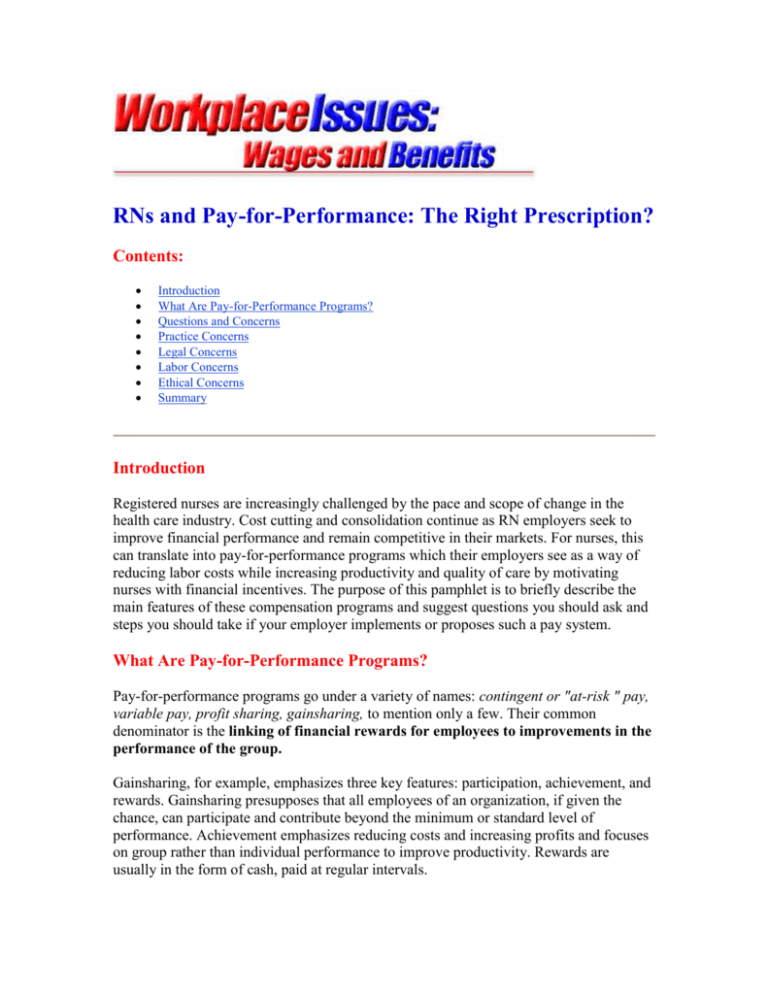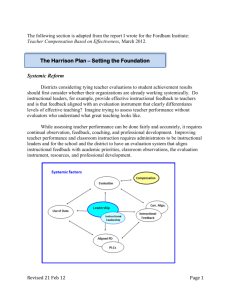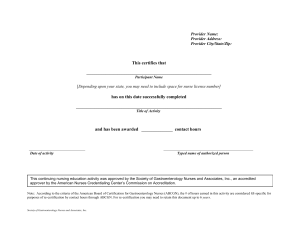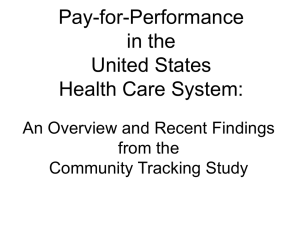
RNs and Pay-for-Performance: The Right Prescription?
Contents:
Introduction
What Are Pay-for-Performance Programs?
Questions and Concerns
Practice Concerns
Legal Concerns
Labor Concerns
Ethical Concerns
Summary
Introduction
Registered nurses are increasingly challenged by the pace and scope of change in the
health care industry. Cost cutting and consolidation continue as RN employers seek to
improve financial performance and remain competitive in their markets. For nurses, this
can translate into pay-for-performance programs which their employers see as a way of
reducing labor costs while increasing productivity and quality of care by motivating
nurses with financial incentives. The purpose of this pamphlet is to briefly describe the
main features of these compensation programs and suggest questions you should ask and
steps you should take if your employer implements or proposes such a pay system.
What Are Pay-for-Performance Programs?
Pay-for-performance programs go under a variety of names: contingent or "at-risk " pay,
variable pay, profit sharing, gainsharing, to mention only a few. Their common
denominator is the linking of financial rewards for employees to improvements in the
performance of the group.
Gainsharing, for example, emphasizes three key features: participation, achievement, and
rewards. Gainsharing presupposes that all employees of an organization, if given the
chance, can participate and contribute beyond the minimum or standard level of
performance. Achievement emphasizes reducing costs and increasing profits and focuses
on group rather than individual performance to improve productivity. Rewards are
usually in the form of cash, paid at regular intervals.
Pay-for-performance programs for non-management hospital-employed registered nurses
are relatively new. Nonetheless, employers nationwide are considering such programs,
and one major HMO has recently instituted a "performance outcome program" designed
to provide monetary incentives to registered nurses in exchange for reduced costs and
increased patient satisfaction. Registered nurses must now seriously consider the
appropriateness of incentive pay programs.
Concerns and Questions
RN compensation programs that may encourage the misuse or misappropriation of
nursing services which could compromise patient care are a matter of great concern. The
context for understanding the nurse's professional obligations is licensure, nurse practice
acts, standards of practice and the code of ethics. Thus, besides important practical
questions related to implementing pay-for-performance programs, there is a more
fundamental question at issue: are RN incentive pay programs professionally
acceptable, and if so, under what conditions? Answering this question requires
understanding the practice, legal, labor, and ethical implications of RN incentive pay
programs. The Institute of Constituent Member Collective Bargaining Programs has
developed a framework of questions to provide context and spur discussion. Ask yourself
these questions if your employer implements or proposes a pay-for-performance
compensation program.
Practice Concerns
How pay-for-performance programs might affect practice is a concern for all nurses.
Consider the following points:
The pay-for-performance program should emphasize improvements in the quality
of patient care (e.g., using ANA's quality indicators to measure and reward
positive outcomes).
The financial risk associated with incentive pay must not precipitate or force
compromises in practice.
No aspects of nursing care should be diminished or lost to the patient because
they are not rewarded by the incentive system.
The pay-for-performance program should lead to greater RN involvement and
effective partnering with management.
Legal Concerns
There may be legal issues if an employer tries to implement a pay-for-performance
program. While laws vary from state to state, nurses may want to consider the following
points:
Determine if your facility can unilaterally implement a pay-for-performance
program. Be aware that, generally speaking, registered nurses may not be
protected should they refuse to participate in a pay-for-performance program.
However, if their employing institution is in the private sector, nurses who
collectively refuse to participate may be protected by the National Labor
Relations Act (NLRA).
The pay-for-performance program should provide for due process for dispute
resolution, for example, a grievance process.
Labor Concerns
Pay-for-performance programs clearly affect various labor issues. Whether you are part
of a collective bargaining unit or not, you should consider the following points:
Think about whether your employer is offering incentive pay as a substitute for
adequate base pay and cost of living increases.
Find out how the pay-for-performance program is to be approved and
implemented. Suggested steps:
o The RN union negotiating team should be a full partner with management
in designing the program.
o There should be a strong vote in favor of the program.
o RN union representatives should serve on committees that administer it.
o The union team should be involved in defining and measuring
"performance targets."
o There should be bargaining unit control over the patient care service being
measured.
o There should be an option to change or discontinue the program.
o It should be clear what consequences follow from unmet performance
targets.
o The system of sharing gain should be understandable and equitable.
Ethical Concerns
Pay-for-performance programs raise a number of ethical questions. Nurses need to
reflect, individually and collectively, on the following:
How might incentive pay affect the nursing profession's longstanding ethical
values of preventing harm, patient advocacy, loyalty, a trusting patient-nurse
relationship and independent professional judgment?
Does the incentive system fit with the values of your hospital?
Does incentive pay foster inappropriate limits in care and decision-making to
benefit the financial interest of the RN at the expense of patient welfare?
Are incentive pay systems which tie a RN's base salary to employer-set targets
more questionable than those with bonus options related to patient care?
Is there an obligation to disclose the nature of the compensation arrangement to
patients? If so, how and by whom should the patient be informed of the financial
situation?
What can registered nurses do, individually and collectively, to maintain
professional integrity when dealing with possible conflicts of interests in financial
incentive systems?
As an RN, would you send a member of your family to your institution if it had an
incentive pay system?
Summary
Nurses, individually and collectively, must confront the complex issues surrounding
incentive pay systems and their impact on professional integrity. The issues and questions
raised here are meant to spark thinking and discussion -- about the tension between a
patient's interests and the RN's self-interest, about whether incentive pay conflicts with
the traditional nursing role of fidelity and advocacy.
ANA is closely monitoring and developing further information on this issue. You can
help by sharing your experiences with pay-for-performance programs. For more
information or to share your experiences, please contact your State Nurses Association
and ANA at 202/651-7124
To receive a hard copy or multiple copies of this brochure, call 1-800-274-4ANA and ask
for item WP-8.
http://www.nursingworld.org/dlwa/wages/wp8.htm
Copyright 1998 by the American Nurses Association. All rights reserved.
Return to the ANA Workplace Issues Homepage.
Search
Contact ANA
Join/Renew Membership
Members Only
NursingInsider Special Offers nursesbooks.org
© 2006 The American Nurses Association, Inc. All Rights Reserved
Copyright Policy | Privacy Statement
Online CE










